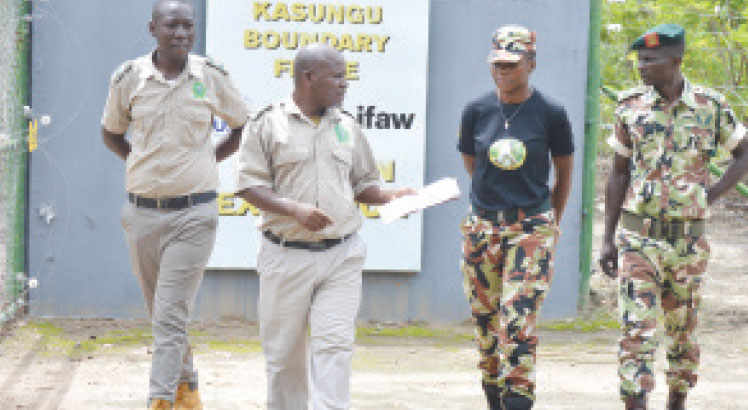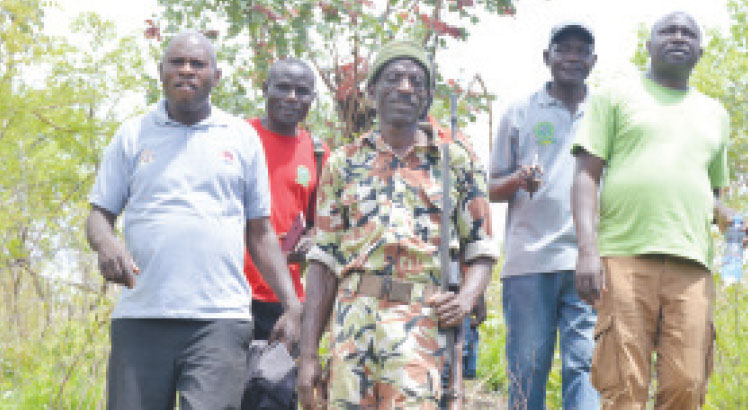T
he fading heads of flowers hang heavy on a freshly dug tomb in Chikakula Village, Traditional Authority (T/A) Mwase in Kasungu. A rough inscription on the plaque reads: Jackson Banda. Died: 23 August, 2023.
His death, aged 31, is a result of breach of each other’s territorial boundaries between animals and communities surrounding national parks and game reserves.
Banda, a father of three, is among those killed by elephants last year in and around Kasungu National Park (KNP). Others are a 31-year-old woman, Masiye Phiri from Chafwamba Village, T/A Chulu and Boniface Nkhata, 45, of Zyambuli Village, T/A Nthunduwala.
The KNP report alleges that he met his fate when he was in a crowd that followed an elephant which had strayed from the park. It reads: “He went ahead of the crowd and the elephant to take a photo, then grabbed the tail of an elephant as the elephant was heading towards the park.
“It was at this time that the elephant got irritated and started chasing the man who only ran for about 38 metres before it killed him. The deceased had earlier covered more than 5km with the crowd following the elephant.”
Nkhata was, however, allegedly killed by a group of elephants that escaped the park through the South Eastern fence-end known as Mzinje around 8 pm on September 5 2023.
Officials from Kasungu National Park
The parks report reads: “Local communities were warned about staying away from the elephants to avoid accidents. It appears this warning was ignored by Nkhata.
“Having received the warning, he proceeded home and told his friends that he was going to remove his shirt and throw it into the air for the elephants to chase and not him.
“Unfortunately, his plan did not work. The place of accident and the park boundary is approximately 13 kilometres away,” details the KNP report.
In explaining Phiri’s demise which occurred on June 3 2023, the park’s management said it established that the mother of five was curious to witness how an elephant breastfeeds her young ones.
“The version was that the deceased went to the garden to witness how an elephant feeds having heard from her fellow women that there was an elephant that was feeding her young.
“The elephant charged towards her and attacked her. She was killed instantly,” the KNP report outlines based on witness testimonies.
Her close to two years old child survived the attack having been thrown from the mother’s back “into the bush.”
While the deaths point to humans not taking precautionary measures, one component stands out; people and animals get close to each other often.
A Nation on Sunday visit to some of the national parks revealed high levels of encroachment as humans are infiltrating the protected areas with settlements as well as agriculture activities.
While regulations specify that human activities must not take place near the buffer zone—a no man’s land—stretching three kilometers from the park boundaries, some people are settling as close as five metres away, an appallingly daring act.
Loyce Luwa is among those that have settled near the park. She says she bought the land after buying it from traditional leaders in 2014. She confesses that confrontation with elephants was rife until three years ago when the government erected a fence.
“We now live peacefully. Our crops are also safe,” she says while winking an expression of ignorance when asked if she knows she has settled on illegal land.
From Nyika National Park hilly spaces, settlements are seen clearly. Encroachment is also chiefs induced as per Jacob Gondwe’s confession. He is a conversation community leader based in Ngonga T/A Chikulamayembe.
“When people were allocating each other land in the protected area, I was given a portion which
I believe was meant to buy my silence but I refused,” he recalls.
He said the tension between the group and communities is ongoing as they are considered a roadblock to communities’ access to the protected land.
Anthony Chikwemba, Nyika National Park manager says in 2021 through The Global Positioning System (GPS), a map reading utility established that several communities were offside.
He said they are expected to do boundary reaffirmation exercises every two years, but due to financial challenges, this doesn’t usually happen. The last was in 2015 then 2021.
Director of Parks and Wildlife Brighton Kumchedwa attributes encroachment to the rise in human population, but commits that his department is positioned for a fight.
“We are retracing the park boundaries in some cases installing beacons as a physical feature of the boundary, evicting encroachers and bringing them before a court of law,” he says in a response to our questionnaire.
The mountainous terrain makes it challenging for fence construction around Nyika National Park. The opposite is true for Kasungu National Park which, with support from the International Fund for Animal Welfare has seen the construction of the 130-kilometre fence.
A significant stretch though remains unfenced pitying the animals and humans in avoidable fights.
“For this year, we are constructing 30 kilometres of fence in the prone area of the park,” promises Kumchedwa.
Officials from KNP indicate that before the fence, elephants would stray at least 600 times a year on average, meaning communities faced 600 threats in just 12 months.
When two elephants fight, they say, the grass suffers. However, when elephants stray, humans suffer.
The post Human, animal conflicts breed awful deaths first appeared on The Nation Online.
The post Human, animal conflicts breed awful deaths appeared first on The Nation Online.
 Moni Malawi
Moni Malawi 

